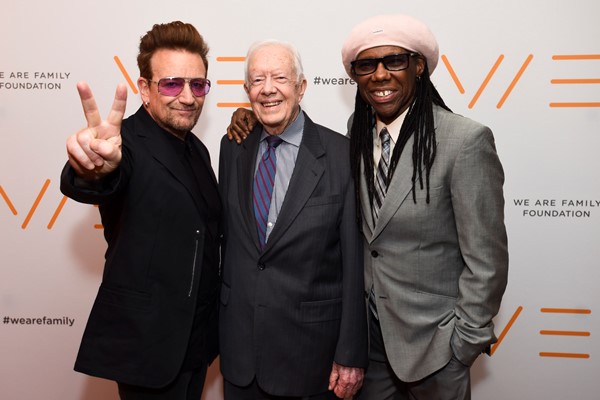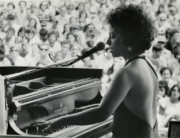
This deeply entertaining documentary looks back on how Jimmy Carter was, indeed, the first president to tap the rock and roll subculture, before the film morphs into a vigorous defense of Carter’s foreign policy and a reexamination of his presidency.
First, the fun stuff. Carter was broke when he decided to run for president. There was no way he had the necessary funds to mount a campaign. So, he decided to call on some friends: the Allman Brothers Band, which held a fund-raiser that helped launched Carter’s campaign. After that, Carter befriended various Southern rockers and outlaw country heroes. Willie Nelson, in particular, became a friend.
The fun of Jimmy Carter: Rock & Roll President is that, even though Carter is interviewed extensively, the story is told by the likes of Nelson, Bob Dylan, Garth Brooks, Trisha Yearwood, and the great keyboardist Chuck Leavell. Their stories are great. Gregg Allman (who passed away in 2017, which gives a time frame of how long this film took to make), tells a wonderful story of how, before he met Carter, the Allman Brothers were invited to a party to jam at the governor’s mansion, and they arrived after everyone had left. Allman describes a man on the porch of the mansion, barefoot and in faded jeans with holes in them, tossing back a tumbler of Jim Beam. The man? Georgia’s governor: Carter.
What comes through is the genuine, unforced affection these musicians have for the former president. They are some of the best storytellers around, and they have lived lives that have given them lots of material. There is Nelson explaining the photo of him with a broken leg sitting with Carter at the White House; Dylan chronicling his conversations with Carter; and Leavell, who has seen a lot, regales us with a story involving standing by Allman after he was arrested for possession of cocaine. Carter’s son Chip describes a time where he didn’t speak to his father for years and they only communicated by letters composed solely of Dylan’s lyrics.
The second reason to see the film is the music: Dickey Betts singing Jimmie Rodgers, the Allman Brothers in their prime running through “Whipping Post,” Sarah Vaughan improvising with Dizzy Gillespie, the Staple Singers in concert on the White House Lawn. It’s a treasure trove. Anyone who loves good music should know that it’s here in spades.
About halfway through the film, Carter makes it to the White House, and a couple of talking heads are added, such as former Secretary of State Madeleine Albright. Here is where the defense and reexamination of Carter’s presidency begins. Albright makes it clear that, probably contrary to current opinion, Carter was very savvy politically and did a great deal for American foreign policy, which is, of course, arguable, but Albright makes a strong case.
Carter, though, makes the strongest: “I’m grateful that I went four years in the White House, and we never dropped a bomb, and we never fired a weapon, and we never shot a bullet to kill another person.” Albright points out that the option was given to him to go in guns blazing to rescue the hostages held in Iran (a different plan than the failed, stealth mission that’s the subject of the recent Desert One), and the president abjectly refused because he believed that hostages would most definitely have been killed.
Ultimately, Carter comes across a genial man centered by his Christian faith who is driven selflessly in his mission for human rights. He also has a great love of music. Luckily for viewers, there were a lot of cameras around to capture it being made.
















Leave A Comment